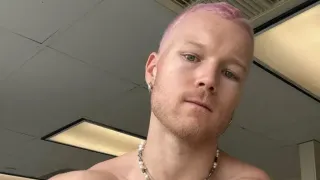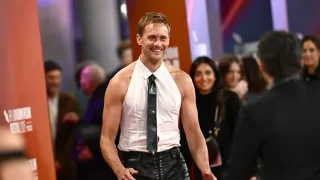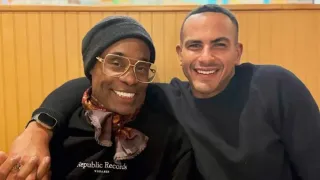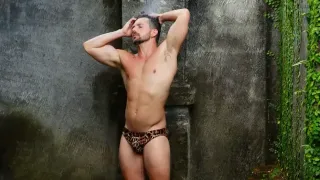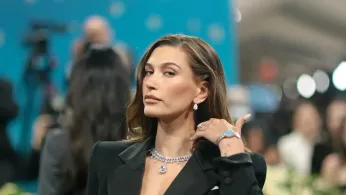
4 hours ago
Hailey Bieber Responds to Transgender Comparison: "As If Being Trans Is a Diss?"
READ TIME: 3 MIN.
Hailey Bieber, a prominent model and businesswoman, has responded to social media commentary suggesting she"looks trans," firmly rejecting the notion that such comparisons should be interpreted as insults. Bieber’s open response has reignited conversations about transphobia in digital spaces and underscored the importance of challenging bias against transgender individuals in popular culture .
Bieber’s remarks came after a wave of comments on her recent selfies where some users insinuated that her facial features or grooming style were"masculine" or"trans-like." Rather than ignoring the commentary or responding defensively, Bieber took to social media to express her views on the matter. In an Instagram story, she wrote:"Stop using the comment'she looks like a man' or'looks trans' as an insult. As if being trans is a diss? People are beautiful, period" .
Her direct statement challenged the underlying assumption that being compared to a transgender woman—or being transgender—is inherently negative. Bieber’s message, which quickly garnered support from LGBTQ+ advocates and allies, emphasized the need to reject both overt and subtle forms of transphobia in the public discourse .
The incident highlights the ongoing challenges transgender people face online, where transphobic comments remain prevalent despite increased visibility and advocacy. The use of terms like"trans" or"man" as insults directed at cisgender women reinforces harmful stereotypes and perpetuates the idea that transgender identities are undesirable or inferior .
Leading LGBTQ+ organizations have consistently called attention to the damaging impact of such rhetoric. According to GLAAD, even seemingly casual comments can contribute to a hostile environment for transgender and gender-nonconforming individuals, affecting mental health and reinforcing exclusion . By publicly addressing the issue, Bieber joins a growing number of celebrities who are using their platforms to call out discriminatory language and behavior.
Bieber’s intervention is significant given her influence as a public figure with millions of followers. Advocacy by celebrities can bring attention to marginalized voices and help shift public opinion toward greater inclusion. In recent years, other high-profile women—including actresses and musicians—have also spoken out against the use of transgender identity as a slur or a means of undermining women’s femininity .
LGBTQ+ advocates point out that such statements from influential figures can challenge the normalization of prejudice and foster a more affirming environment for transgender people. Sarah McBride, a prominent transgender activist and current Delaware State Senator, has previously noted:"When celebrities speak out against transphobia, they help create a culture where all identities are respected and valued" .
The reaction to Bieber’s comments has been largely positive, with many LGBTQ+ individuals and allies expressing gratitude for her stance. Social media users responded with messages of support, crediting Bieber for using her voice to stand up against transphobia and promote respect for all gender identities .
However, the incident also exposed persistent challenges. Some online reactions continued to echo transphobic sentiments, underscoring the ongoing need for education and advocacy. Transgender model Munroe Bergdorf highlighted that"the fight against transphobia requires sustained effort and solidarity, especially from those with public platforms" .
The targeting of women—both cisgender and transgender—based on their appearance is not new. Beauty standards are often policed through a narrow, exclusionary lens, with deviations from conventional femininity subject to ridicule or delegitimization . When public figures are compared to transgender women as an insult, it reinforces the notion that femininity is fragile and that transgender women are somehow"lesser" or"inauthentic" .
Transgender advocates argue that these dynamics not only harm trans people, but also contribute to a hostile environment for all women, limiting the ways they are permitted to express themselves. By openly rejecting such comparisons as a"diss," Bieber challenges these restrictive norms and encourages a broader definition of beauty that includes all gender identities .
The conversation sparked by Bieber’s comments serves as a reminder of the work yet to be done in dismantling transphobia and building a more inclusive culture. LGBTQ+ organizations encourage ongoing education, dialogue, and allyship—especially from those outside the transgender community. As GLAAD notes,"Allyship means listening to transgender voices, amplifying their experiences, and challenging bias wherever it appears" .
Bieber’s response, while brief, demonstrates how those in the public eye can leverage their influence to foster acceptance and challenge harmful narratives. Her message—"People are beautiful, period"—resonates as a call to action for greater empathy, respect, and solidarity across all communities.

